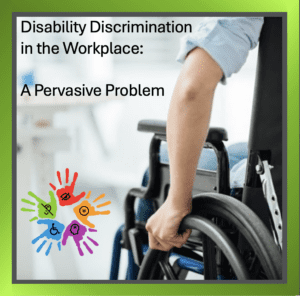Disability Discrimination in the Workplace: A Pervasive Problem
Recent findings from a TUC survey have revealed the troubling reality faced by disabled workers across the UK. According to the survey of 1,000 workers, 39% of disabled employees have experienced “pervasive” bullying, discrimination, and harassment related to their disability in the past five years. This alarming statistic highlights a significant workplace issue that demands immediate attention.
The Scale of the Problem
The TUC survey uncovered several disturbing trends:
- 15% of disabled workers have faced intrusive questioning about their disability
- 14% reported feeling uncomfortable due to stereotypes
- Over 12% experienced sustained bullying directly linked to their disability
These findings align with broader statistics showing that workplace discrimination against disabled individuals remains a persistent challenge. More than one in three (38%) UK adults feel they have been subject to discrimination at work, with that figure rising significantly for people from minority groups.
The problem extends beyond the workplace environment itself. Nearly two-fifths 39% of surveyed adults believe they’ve been turned down from jobs due to discrimination. For disabled people specifically, the employment landscape remains particularly challenging, with a significant gap between employment rates for disabled and non-disabled individuals.
The Legal Landscape
The TUC has highlighted that Labour’s Employment Rights Bill, currently in the House of Lords, will introduce crucial protections to address this widespread mistreatment. This represents a potential step forward in tackling discrimination.
Currently, disability discrimination is covered under the Equality Act 2010, which makes it unlawful to discriminate against disabled people in employment and other areas. Direct disability discrimination occurs when an employer treats a disabled person less favourably because of their disability.
HR’s Role in Creating Inclusive Workplaces
Human Resources departments play a pivotal role in addressing disability discrimination. Here are comprehensive strategies HR professionals can implement:
Policy Development and Implementation
- Create comprehensive anti-discrimination policies with specific provisions addressing disability discrimination
- Ensure policies outline clear reporting procedures and consequences for discriminatory behaviour
- Regularly review and update policies to reflect changing legislation and best practices
Training and Education
- Implement mandatory disability awareness training for all employees
- Provide specialised training for managers on accommodating disabilities and creating inclusive teams
- Facilitate open discussions about unconscious bias and stereotypes regarding disabilities
Accommodation Processes
- Develop streamlined, dignified processes for requesting reasonable accommodations
- Train managers to handle accommodation requests properly and sensitively
- Regularly review accommodation effectiveness and adjust as needed
Reporting Mechanisms
- Create multiple, accessible channels for reporting discrimination
- Ensure confidentiality in the reporting process
- Establish clear investigation procedures that protect both the complainant and accused
Recruitment and Hiring Practices
- Review job descriptions and requirements to eliminate unnecessary barriers
- Train hiring managers on inclusive interviewing techniques
- Implement blind résumé screening where possible to reduce bias
Performance Management
- Ensure performance metrics account for reasonable accommodations
- Train managers to evaluate disabled employees fairly
- Regularly audit promotion and advancement patterns to identify potential systemic issues
Building an Inclusive Culture
- Celebrate diversity and inclusion through company events and communications
- Establish employee resource groups for disabled employees and allies
- Recognise and reward inclusive behaviours and practices
Monitoring and Accountability
- Track metrics related to disability inclusion and representation
- Conduct regular surveys to assess workplace climate for disabled employees
- Hold managers accountable for encouraging inclusive environments
Expert Perspectives
TUC General Secretary Paul Nowak has emphasised the urgent need for change: “NO ONE should face bullying, harassment or discrimination at work. But the number of disabled workers reporting that this is their everyday experience is shockingly high. It’s time to stamp out this pervasive mistreatment. Disabled workers deserve dignity and respect at work like every other worker does.”
This statement emphasises the moral imperative to create truly inclusive workplaces where all employees are treated with dignity.
The Business Case for Inclusion
Beyond the ethical imperative, addressing disability discrimination makes sound business sense. Organisations that effectively support disabled employees benefit from:
- Access to a wider talent pool
- Improved innovation through diverse perspectives
- Enhanced company reputation and brand value
- Reduced legal risks and associated costs
- Higher employee engagement and retention
Moving Forward
The findings of the TUC survey serve as a wake-up call for organisations across the UK. As mandatory disability pay reporting becomes a requirement for larger employers under the proposed Equality Race and Disability Bill, companies will face increased scrutiny regarding their treatment of disabled employees.
By taking proactive steps to address discrimination, HR departments can not only ensure legal compliance but also support truly inclusive workplaces where all employees can thrive. The time for meaningful action is now.
If you need assistance with the above, let Tick HR help. Call us today at 07745 535 635.

